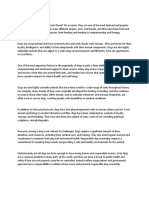0% found this document useful (0 votes)
25 views2 pagesClass Notes Dog
Dogs are domesticated mammals from the Canidae family, known for their loyalty and intelligence. They serve various roles including companionship, assistance, and protection, and come in different breeds with unique characteristics. Responsible ownership involves proper nutrition, health care, exercise, and training to ensure their well-being.
Uploaded by
ABHISHEK MUKHERJEECopyright
© © All Rights Reserved
We take content rights seriously. If you suspect this is your content, claim it here.
Available Formats
Download as PDF, TXT or read online on Scribd
0% found this document useful (0 votes)
25 views2 pagesClass Notes Dog
Dogs are domesticated mammals from the Canidae family, known for their loyalty and intelligence. They serve various roles including companionship, assistance, and protection, and come in different breeds with unique characteristics. Responsible ownership involves proper nutrition, health care, exercise, and training to ensure their well-being.
Uploaded by
ABHISHEK MUKHERJEECopyright
© © All Rights Reserved
We take content rights seriously. If you suspect this is your content, claim it here.
Available Formats
Download as PDF, TXT or read online on Scribd
/ 2
























































